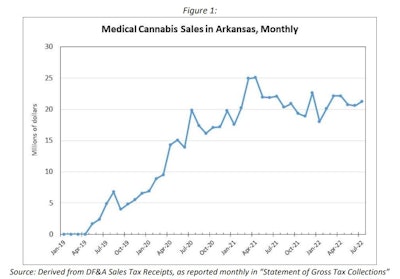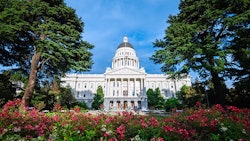
On Nov. 8, Arkansas voters will have their say on adult-use legalization, a good six years after they first greenlit a medical marketplace.
The constitutional amendment, if passed, would allow cannabis sales from state-licensed dispensaries to anyone 21 or older. At-home cultivation would not be permitted.
With at least two years of grassroots organizational work leading up to this point, the mere act of getting on the ballot has not been easy. Earlier stabs at a constitutional amendment ended up collapsing during the early months of the pandemic; there was simply no way to gather the required number of signatures for the 2020 ballot while registered voters were self-quarantining.
Those 2020 efforts came on the shoe leather of Arkansans for Cannabis Reform and Arkansas True Grass. The former eventually folded into Arkansas NORML. The latter put forth its own 2022 ballot effort, which would have included at-home cultivation in its language, but the attempt to get in front of voters ultimately fell short. Both groups oppose Issue 4.
What happened in 2021 is that a new group emerged: Responsible Growth Arkansas, which delivered more than double the required signatures to earn a spot on the November 2022 ballot. Responsible Growth Arkansas positioned cannabis tax revenue as a source of funding for police departments as a tentpole of its mission.
Steve Lancaster, the group’s attorney, pointed out that a more conservative approach was necessary against the backdrop of Arkansas politics. "I think ultimately we’re in Arkansas, and there are some things we can get and some things I don’t think voters are ready to give,” he said. “What we did was try to put together an amendment we think would be satisfactory to Arkansas voters. The issues like expungement and things like that, I don’t think any of us have any opposition to that."
And yet it still wasn’t terribly easy to get onto the ballot. Earlier this summer the Arkansas Board of Elections argued that Responsible Growth Arkansas did not clearly stipulate a THC limit on edibles—and subsequently denied the constitutional amendment language. Then, in late September, the Arkansas Supreme Court overturned the state’s Board of Election Commissioners’ denial.
With the high court’s go-ahead, the constitutional amendment will appear on the ballot as Issue 4.
Recent polling suggests 59% statewide support for the amendment.
To supply the market under Issue 4’s structure, the state would issue eight Tier 1 cultivation licenses to the current medical growers. The state would issue another 12 Tier 2 cultivation licenses. Those Tier 2 license-holders would be capped at 250 mature plants at a given time.
On the retail side, the state would extend opportunities for medical dispensaries to serve adult-use customers, as well. The 40 extant medical dispensary license holders would be allowed to begin serving adult-use customers and go on to open another recreational-only dispensary location. And then the state would tee up another 40 retail licenses to be issued at a later date. That would bring the total to 120 dispensary locations across the state.
In Arkansas, medical dispensaries may also grow a limited number of plants and operate as vertically integrated businesses on a small scale.
“The measurable economic impact of introducing an adult-use marijuana market, including economic activity diverted from illicit markets, is estimated to increase state gross domestic product by up to $2.36 billion over five years and increase employment of up to 6,400 jobs by 2027,” Michael Pakko, chief economist at the Arkansas Economic Development Institute, said in a press release announcing a new economic impact study.

That’s a significant jump, considering that the state will likely bring in about $200 million in medical cannabis sales this year.
But not everyone is solely focused on Issue 4 as the state’s pathway to adult-use cannabis.
Arkansas NORML, which comprises several other reform groups that had merged into the single statewide entity, is looking ahead to the general election in 2024.
"[Arkansas NORML's 2024 initiative is] the only people-oriented option,” according to the group. “When you control the industry, you can set the prices to whatever you want to and make people pay it. [Issue 4] would also destroy the medical industry we worked so hard to build. It’s worth the risk to vote ‘No'. Something is not always better than nothing. This is not better than nothing. This is actually worse."?
Voters will chime in on the matter Nov. 8.

























